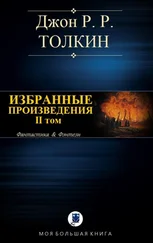The king of the Elves hastened now down the river to the Long Lake. He sent ahead great store of goods by water. Five days after the death of the dragon the elves came to the shores and looked on the ruins of the town. Their welcome was good, [100]and the men and their Master were ready to do anything in return for the Elvenking’s aid.
Their plans were soon made. With the women and the children, the Master remained behind; and with him were some men and many skilled elves; and they started building many huts by the shore; and also they began the planning of a new town, but not in the same place. They removed northward higher up the shore because they had fear of the water where the dragon lay.
All the other men and most of the Elvenking’s warriors went to the Mountain. So in eleven days from the ruin of the town they came into the desolate lands.
Chapter 15
The Gathering of the Clouds
Now we will return to Bilbo and the dwarves. All night one of them had watched, but when morning came they had not heard or seen any sign of danger.
Suddenly Bilbo cried: “There is that old thrush again!”
Sure enough the old thrush was there. He sang; then he stopped singing and listened to something; and again he sang, and again he listened.
“I think he is trying to tell us something,” said Balin, “but I don’t understand his speech.”
Then the old thrush flew away but soon he came back; and with him came a very old bird. He was almost blind, he could hardly fly, and the top of his head was bald. He was an old raven of great size. He got down on the ground before them and bobbed towards Thorin.
“O Thorin son of Thrain, and Balin son of Fundin,” he croaked (he used ordinary language and not bird-speech). “I am Rac son of Carc. Carc is dead, but he was well known to you once. Now I am the chief of the great ravens of the Mountain. I want to tell you some great news. The birds are gathering back again to the Mountain and to Dale from South and East and West, because Smaug is dead!”
“Dead! Dead!” shouted the dwarves. “Dead! Then the treasure is ours!”
“Yes, dead,” said Rac. “The thrush saw him fall in battle [101]with the men of Esgaroth three nights ago.” The dwarves started shouting with joy, but Rac went on:
“You may go back to your halls in safety; all the treasure is yours – for the moment. But already a host of the elves is on the way. By the lake men say that their sorrows are due to the dwarves. [102]They want to get compensation from your treasure.
“So don’t trust the Master of the Lake-men. But you should trust the man who shot the dragon with his bow. His name is Bard, he is of the race of Dale, of the line of Girion. We would like to see peace once more among dwarves and men and elves after the long desolation; but it may cost you a lot of gold.”
Then Thorin answered: “Thank you, Rac Carc’s son. We will not forget you and your people. But thieves will never take our gold while we are alive. Please bring us news about anyone who comes near. Also I beg you, send your messengers to our relatives and tell them of our troubles. But go especially to my cousin Dain in the Iron Hills, for he has many well-armed people, and he lives nearest to this place. Tell him to hurry!”
“I will do as you ask,” croaked Rac. Then off he slowly flew.
“Back now to the Mountain!” cried Thorin. “We have little time to lose.”
So the dwarves and Bilbo returned to the Mountain.
They explored the caverns once more, and found that only the Front Gate remained open; all the other gates (except the small secret door) had long ago been broken by Smaug. So now they began to fortify the main entrance, and remake the road that led from it.
As they worked the ravens brought them news. The dwarves learnt that three of the elves’ ponies had escaped and were wandering near the Running River, not far from where they had left their stores. So Fili and Kili found the ponies and brought back all they could.
Four days later they knew that the joined armies of the Lake-men and the Elves were hurrying towards the Mountain. But now they had food for some weeks, and already the gate was blocked with a wall of stones. There were holes in the wall through which they could see (or shoot) but no entrance. They climbed in or out with ladders, and pulled things up with ropes. They had made a small low arch under the new wall for the stream. It was now only possible to approach the Gate along a narrow ledge of the cliff. The dwarves had brought the ponies only to the head of the steps above the old bridge, and then unloaded them and sent them back to the South.
There came a night when suddenly they saw many lights away south in Dale before them.
That night the dwarves slept little. In the early morning they saw a company approaching. The warriors came up to the valley’s head and climbed slowly up. Soon they were greatly surprised to see the pool before them and the Gate blocked with a wall of stone.
And then Thorin called in a very loud voice:
“Who are you? Why have you come to the gates of Thorin son of Thrain, King under the Mountain, and what do you want?”
But they answered nothing. Some turned swiftly back, and the others soon followed them. That day the camp was moved and was brought between the arms of the Mountain. [103]The elves started playing their sweet music.
Then the dwarves themselves made music to soften Thorin’s mood; their song was like the song they had sung long before in Bilbo’s little hobbit-hole.
“Under the Mountain dark and tall
The King has come into his hall!
His foe is dead, the Worm of Dread,
And ever so his foes will fall.”
This song pleased Thorin, and he smiled again.
The next morning a company of spearmen crossed the river, and marched up the valley. They bore with them the green banner of the Elvenking and the blue banner of the Lake, and they stood before the wall at the Gate. Again Thorin said in a loud voice:
“Who are you and why have you come to the gates of Thorin son of Thrain, King under the Mountain?”
A tall man cried:
“Hail Thorin! We are not yet foes, and we are glad that you are alive. We have come to talk.”
“Who are you, and what would you like to talk about?”
“I am Bard, I killed the dragon and so you could get your treasures. I am by right descent the heir of Girion of Dale, [104]and in your hall there is wealth which Smaug stole from the town. Is not that a matter of which we can talk? Also, in his last battle, Smaug destroyed the houses of the men of Esgaroth, and I am yet the servant of their Master. I would like to ask you for recompense.” It was true and fair. And Bilbo thought that Thorin would show generosity and help those in need. But Thorin didn’t want to think about poor people.
“You put your worst cause last and in the chief place,” Thorin answered. “To the treasure of my people no man has a claim, because Smaug who stole it from us also robbed us of life or home. The treasure was not his. The price of the goods and the assistance that we received of the Lake-men we will fairly pay. But we will give nothing under threat of force. While an army lies before our doors, we look on you as foes and thieves.”
“But still my other claims remain unanswered,” replied Bard.
“I will not discuss any questions, as I have said, with armed men at my gate. And if you would like to speak with me again, first send the elves away to the woods where they belong, and then return, laying down your arms before you approach the threshold.”
“The Elvenking is my friend, and he has helped the people of the Lake,” answered Bard. “We will give you time to change your mind. Gather your wisdom before we return!” Then he went back to the camp.
Читать дальше
Конец ознакомительного отрывка
Купить книгу
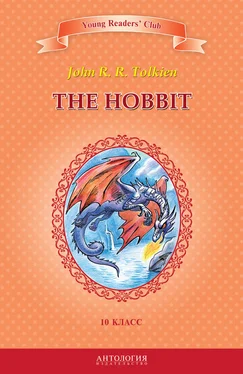
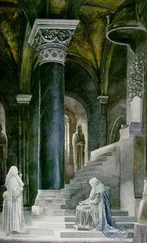

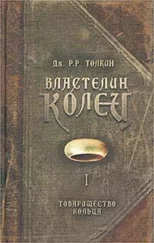

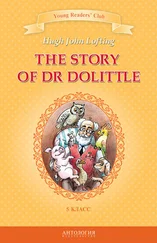

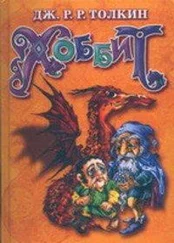
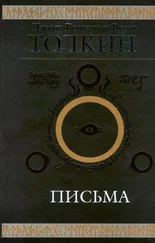
![Джон Толкин - Хоббит [litres]](/books/390419/dzhon-tolkin-hobbit-litres-thumb.webp)
![Джон Толкин - Путешествие хоббита [сценарий спектакля]](/books/395951/dzhon-tolkin-puteshestvie-hobbita-scenarij-spektakl-thumb.webp)
